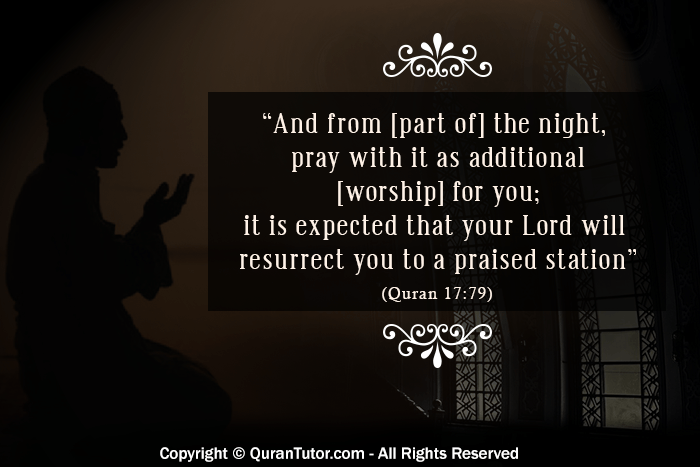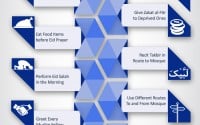Importance and Method of Performing The Tahajjud Prayer
Consider yourself among pool of people standing in the realm of supreme deity for the accountability of committed deeds, pleading for mercy and forgiveness. All standing on the same scale but few get distinction upon their innumerable extra deeds that they have done for merely Allah’s pleasure. That contrition time would be too late to ask your Rab to grant extra time for supplication and to offer His appraised rituals. Surmising, Allah has entitled few prayers with unique peculiarity that will increase the status and stature of a Muslim at the day of Resurrection. The deeds of distinction entail Tahajud prayers about which the Exalted God says:

“And from [part of] the night, pray with it as additional [worship] for you; it is expected that your Lord will resurrect you to a praised station.” [Quran 17:79]

Linguistically “Tahajud” is derived from “Hajjada” meaning “to awake at night,” which alternately has epithets of “Qayam al-Layl” and witar.” Tahajud is not an obligatory prayer but many devout Muslims have made it part of their life as sign of their devotion and as an opportunity to earn redemption from the Lord of the universe. Allah has declared it one of the qualities of the pious people who abandon their sleep in order to observe vigil at night for beseeching mercy at the final Day of Judgment as narrated:

“And those who spend [part of] the night to their Lord prostrating and standing [in prayer].” [Quran 25:64]
Invoke Your Rab in the Silence of Nights
Number of Hadith and verses reinforces the significance of invoking Allah Almighty by supplication and prayers in the darkest nights when Allah descends on the lower earth, is close than jugular vein and listens to the unspeakable desires of His worshippers.
“The Lord descends every night to the lowest heaven when one-third of the night remains and says: ‘Who will call upon Me, that I may answer Him? Who will ask of Me, that I may give him? Who will seek My forgiveness, that I may forgive him?’” [Bukhari, Muslim]
Performing Tahajud with Clear Conscience
Tahajud is highly deemed voluntary prayers recommended by Sacramental scriptures to attain the level of earmark that Allah Almighty wants Muslims to emblazon their hearts.
“Observe the night Prayer; it was the practice of the righteous before you and it brings you closer to your Lord and it is penance for evil deeds and erases the sins and repels disease from the body.” [At-Tabarani]
Offering Tahajud in Light of Sunnah
Sunnah of Muhammad (PBUH) is the most accepted way to grasp gazillion bounties from a single act if accomplished with clear conscience and fine intention. Offering Tahajud in pursuit of Muhammad Prophet (PBUH)’s Sunnah encompasses following fine steps including:
1. Intention to Be Made
Allah the Merciful judges every act on the intention that has made prior to the obligatory or voluntary prayers. Make Niyyah for Tahajud prayers when intend to sleep, the vitality of Niyyah lies in the virtues that it will impart on the Muslim who will miss it due to any reason.
“Whoever goes to his bed with the intention of getting up and praying during the night, but, being overcome by sleep, fails to do that, he will have recorded for him what he has intended, and his sleep will be reckoned as a charity (an act of mercy) for him from his Lord.” [An-Nasa'i and Ibn Majah]
2. Glorification to the Lord of Universe
Prior commencing Tahajud prayers Muhammad (PBUH) at times engaged himself in the glorification of Lord for seeking His forgiveness to be guided on the right track as narrated:
“When Allah’s Messenger got up at night to pray, he used to extol Allah’s greatness ten times then praise Him ten times. Then he would say “Glory and praise be to Allah” ten times. Then he would say “Glory be to the Holy King” ten times. Then he would ask Allah for forgiveness ten times. Then he would say “There is no God but Allah” ten times.” [Bukhari]
3. Self Purification Before Prostration
Cleanliness is half faith and self-purification is obligatory before prostrating in front of Allah Almighty. Muslims perform Wudu for obligatory prayers and hence are essential for the voluntary prayers. Despite being the physical cleanness, Wudu pertains to warding off Satan who continuously instilling evil whispers in the hearts of the worshippers making them astray from the divine path.
4. Number of Raka’ah in Tahajud
After mental declaration, one should start offering Tahajud with two Raka’ah. The chain of Raka’ah can extend depending on the individual physical capability and will power because it does not entail explicitly any number of Raka’ah as quoted in Hadith:
“While the Prophet was on the pulpit, a man asked him how to offer the night prayers. He replied: ‘Pray two Raka’ah at a time and then two and then two and so on, and if you are afraid of the dawn (the approach of the time of the Fajr prayer) pray one Raka’ah and that will be the witar for all the Raka’ah which you have offered.” [Bukhari]
However, the Tahajud Raka’ah should be odd as per Muhammad Sunnah and as Narrated by Hazrat Ayesha (RA):
“It was seven, nine, or elevenRaka’ahbesides the two Raka’ah of the Fajr prayer (i.e. Sunnah).” [Bukhari]
5. What to Say in Tahajud Prayers
Emulate the practice of Muhammad (PBUH) while offering Tahajud prayers who used to recite Surah Baqarah, Surah Nisa and Surah Al-Imran in iqamah and then contemplate on its meanings to strengthen his faith. Without any rush, Prophet Muhammad used to complete the entire Surah in bow-down position as stated in Hadith:
“I offered Salah (Tahajud – optional night prayer) with the Prophet one night, and he started reciting (Surah) Al-Baqarah. I thought that he would bow at the end of one hundred Verses, but he continued reciting. I, then, thought that he would perhaps recite the whole (Surah) in a Raka’ah, but he proceeded on, and I thought he would perhaps bow on completing (this Surah); he then started (reciting Surah) An-Nisa’; he then started (Surah) Al-Imran and his recitation was unhurried. [Muslim]
6. Perfect Time for Tahajud
Tahajud prayers can be offered from Isha prayers until Subah Sadiq (the true dawn) as no specific or exact time has been marked in the sacred scriptures but has deemed necessary upon one’s ease. Despite convenient time, the Witar prayers can be performed in early night, middle night and latter night but among three the best one that Prophet Muhammad (PBUH) has told to his followers is the middle night as quoted:
Abu Muslim asked Abu Zharr: “Which late-night prayer is the best?” He said: “I asked the Messenger of Allah the same that you asked me and he said, ‘The (one done during) middle of the latter half of the night, and very few do it.’” [Ahmad]
7. Practice After Tahajud Prayers
It was the custom of our beloved prophet to recite Quran after Tahajud prayers. He would supplicate with awe, devotion, and full zeal for the forgiveness of his entire Ummah in order to plead for Allah’s blessings. The custom of Muhammad (PBUH) reciting Quran keenly can be extracted from the following Hadith narrated by Ayesha (RA):
“I did not see the Prophet reciting (the Quran) in the night prayer while sitting except when he became old; when he used to recite while sitting, and when thirty or forty verses remained from the Surah, he would get up and recite them and then bow.” [Bukhari]
If you want to learn to recite Quran with Tajweed, join Quran Tutor Academy & attend online Quran Classes to become proficient in Quran Reading.
In short, the voluntary prayers invigorate the relation with Allah Almighty that will prove to be the absolution and savior at Dooms Day for atoning sins as stated in Hadith:
“The Messenger of Allah ordered us to pray during the night, a little or a lot, and to make the last of the Prayer the Witar Prayer.” [At-Tabarani]









